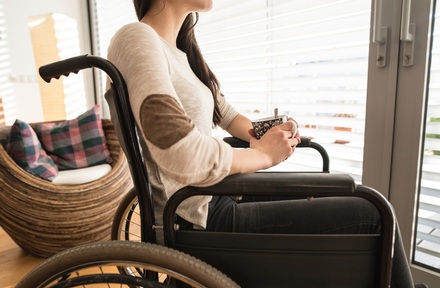Disabled people and carers are twice as likely to lose job, charity warns
Disabled people and carers are at least twice as likely to face redundancy, than the rest of the working population, warns Citizens Advice.

In its report ‘An Unequal Crisis’, the charity found disabled people whose disability has a big impact on their daily life, as well as those who previously shielded, are more likely to face redundancy.
Over a quarter of disabled people (27 per cent) are facing redundancy, according to a survey of 6,015 people conducted in June and July by the charity.
This figure rose to more than a third of disabled people (37 per cent) who said their disability has a large impact on their day-to-day life.
Almost half of those who were in the shielded group (48 per cent), as they were extremely clinically vulnerable to coronavirus, were at risk of being sacked.
Carers as well as parents are twice as likely to lose their jobs with two fifths of parents or carers (39 per cent) facing redundancy.
The charity has seen demand for its one-to-one advice on redundancy increase almost seven-fold since February.
In July, the charity’s advisers saw 2,508 people with redundancy selection issues, compared to just 368 in February.
The charity has given redundancy advice to 6,353 people since lockdown began. Visits to its redundancy discrimination page doubled from 7,000 in May to 14,000 in July.
Woman with health conditions sacked after telling her boss she felt unsafe
The charity gave the example of a woman with underlying health conditions who was made redundant a week after telling her boss she felt unsafe returning to work.
Jamie McGlynn, contact centre manager at Citizens Advice Manchester, said: "We're seeing a lot of redundancy issues, but it gives you a sinking feeling when someone who's been shielding, is a carer or has young kids tells you they've been picked as the first to go.
“People are absolutely wracked with worry.
“One lady with underlying health conditions told her employer she felt unsafe about returning to work as another worker had COVID symptoms but wasn’t isolating. The next week she had her redundancy notice through.
"We know what we're seeing now could be just the tip of the iceberg."
The charity’s advisers are dealing with a redundancy issue every two minutes. In July, it recorded nearly 415,000 visits to its redundancy pages overall, compared to over 75,000 this time last year.
Citizens Advice says all workers are protected by law against discrimination but workers currently have no guarantee these laws will be enforced.
The charity said workers who have been unfairly treated could take their case to an employment tribunal but there was already a backlog of 400,000 cases before the COVID-19 outbreak in the UK.
Disabled and shielding ‘pushed to the front’ of redundancy queue
Dame Gillian Guy, chief executive of Citizens Advice, said: “Employers face difficult choices but there are worrying signs disabled workers, people who shielded, parents and carers are being pushed to the front of the queue when it comes to redundancy.
“As tough as these times are, they cannot be used as an excuse to break the rules.
“If someone is facing an unfair redundancy, the odds of getting redress under the current system are stacked against them. Workers need a watchdog that will be a one-stop shop to protect their employment rights.”
The charity is calling for a single watchdog to enforce employees’ rights, which the government promised to establish in the 2019 Queen’s Speech.
Meanwhile, Citizens Advice wants emergency funding to be given to existing enforcement bodies.
Half a million disabled face twice the disadvantage in a job hunt, disability campaigners are warning. Government figures from last year reveal a 28.6 per cent gap between the employment rates of disabled and non-disabled people.
In a letter to government ministers, disability rights campaigners have asked for changes to the government’s Plan for Jobs, to avoid an unemployment crisis among disabled young people.
Without the changes, the group says the double disadvantage of disability discrimination and a huge increase in competition for jobs caused by the pandemic, will leave disabled people at risk of long-term unemployment.
The organisations signing the letter include Leonard Cheshire, Thomas Pocklington Trust, Disability Rights UK, Genius Within, the National Development Team for Inclusion, Natspec, National Deaf Children's Society, the Institute for Employment Studies and the Council for Disabled Children.
click here for more details or to contact Leonard Cheshire Disability
Latest News
 29-Jul-24
Dementia Bus gives carehome.co.uk staff insight into life with dementia
29-Jul-24
Dementia Bus gives carehome.co.uk staff insight into life with dementia
 27-Jul-23
UK's top home care agencies in 2023 revealed
27-Jul-23
UK's top home care agencies in 2023 revealed
 30-Nov-22
A quarter of older people keep their falls secret from family
30-Nov-22
A quarter of older people keep their falls secret from family
 29-Nov-22
'Covid-19 has not gone away' say terminally ill
29-Nov-22
'Covid-19 has not gone away' say terminally ill
 28-Nov-22
IT consultant who received poor care opens 'compassionate' home care business
28-Nov-22
IT consultant who received poor care opens 'compassionate' home care business